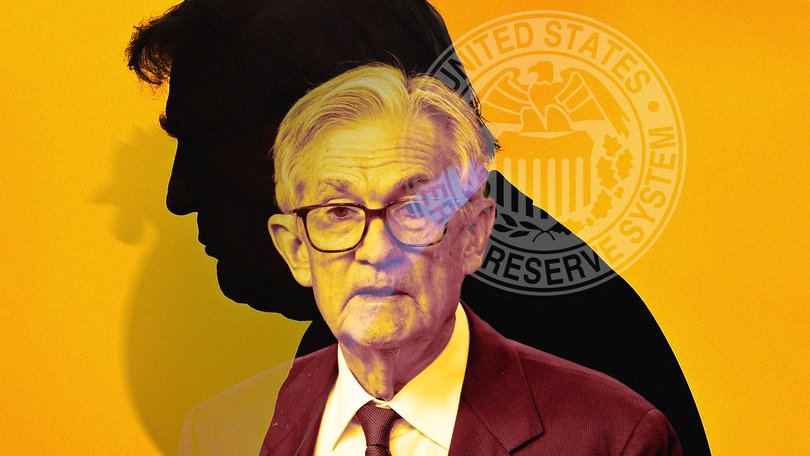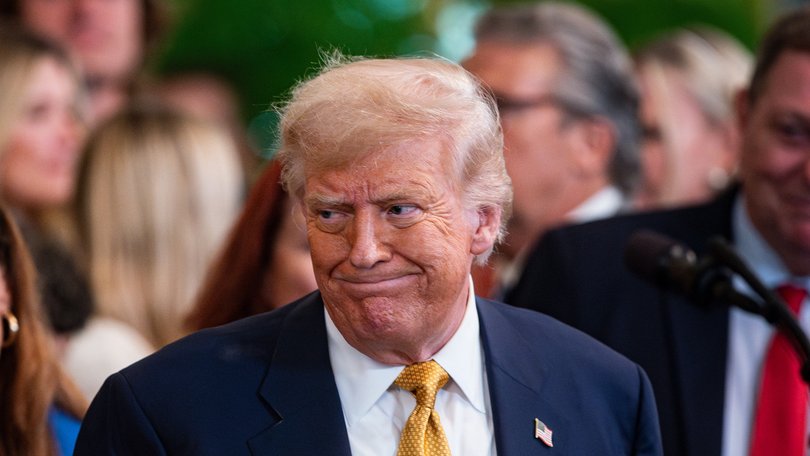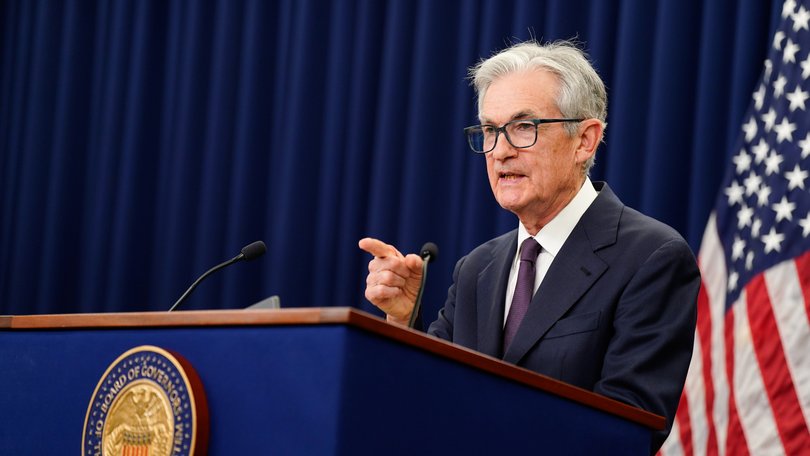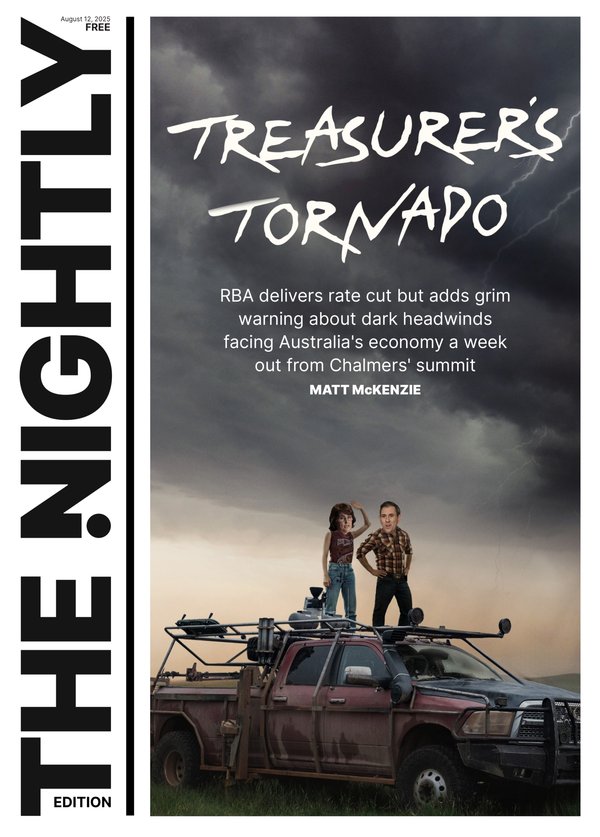JACKSON HEWETT: TACO man Donald Trump caves on Fed, China. Can the bully be bested?

Like all bullies, Donald Trump has shown he doesn’t have the stones when it comes to a real contest.
The President has been carping about Federal Reserve chair Jerome Powell for months, hectoring him about cutting interest rates, and calling him all sorts of names.
Trump may talk loudly but the bond market holds the big stick.
Sign up to The Nightly's newsletters.
Get the first look at the digital newspaper, curated daily stories and breaking headlines delivered to your inbox.
By continuing you agree to our Terms and Privacy Policy.Overnight, his administration leaked that Mr Trump had waved a drafted letter firing Powell in front of a dozen House Republicans.
The leak was clearly to test the market reaction.
And the market reacted. The dollar tumbled, stocks fell and most importantly, yields on long-duration bonds spiked.
Trump is hoping that in getting rid of Powell, he can get his longed-for rate cut. But the US Government is already flying too close to the sun on its debt and deficit ways following the passage of the One Big Beautiful Bill which heaps another $US3 trillion onto an already bloated debt to GDP ratio.
Bond markets seemed to have swallowed that bitter pill for now, but damaging the independence of the Fed, one of the key pillars of the US economic system, is clearly a bridge too far.
According to US-based Australian economist Justin Wolfers $US250 billion ($386) was wiped off “in minutes”.

Mr Trump quickly backtracked.
“We’re not planning on doing anything,” he told reporters at the White House. “I don’t rule out anything, but I think it’s highly unlikely. Unless he has to leave for fraud.”
With that, markets rebounded to ultimately end the day higher, convinced that the Trump Always Chickens Out (TACO) trade was alive and well.
In a display of classic Trump the character arsonist, he tried to pour fuel on the Powell firing but pretended someone else held the matches.
“I talked to them (House Republicans) about the concept of firing him,” Mr Trump said. “I said, ‘What do you think?’ Almost all of them said I should. But I’m more conservative than they are.”
Trying to roll Powell would result in an almighty bond fire, one that could potentially crash the global economy.
Jamie Dimon, chief executive of the US’s largest bank JP Morgan, said Fed independence was “absolutely critical,” on a conference call Tuesday, and meddling with it “can often have adverse consequences”.
“Today’s market movements suggest that Fed independence is an incredibly valuable asset and Americans should be very careful to preserve it,” Mr Wolfers wrote on X.

Mr Trump is clearly emboldened by the passage of the One Big Beautiful Bill and by the so far limited impact of tariffs on inflation. Despite the uncertainty he has fomented, the US economy has performed better than expected in the past couple of months according to the Federal Reserve’s Beige Book survey of regional businesses.
But the impact of tariffs on inflation is starting to grow as businesses experience “modest to pronounced input cost pressures related to tariffs,” the Beige Book said.
US inflation data showed a lift in prices of apparel and home goods. But the full effect of tariffs is more likely being absorbed by businesses in the hope of a tariff TACO.
But it looks like Donald Trump only chickens out when he meets his match.
The bond market is clearly one, and it looks like China is the other.
On the same day Mr Trump tried and failed to upend the independence of the Federal Reserve, his advisers were floating a rapprochement with Beijing.
According to Bloomberg Trump has “dialled down his confrontational tone” with China, hoping to set up an economic summit and fend off a restart of the 145 per cent reciprocal tariff that would occur on 12 August at the end of the 90 day truce.
The report suggests that the US President is open to cutting purchase deals and carve outs.
It’s a far cry from how he is treating other nations who not only got slapped with tariff demands of up to 50 per cent on countries like Brazil and 25 per cent on Japan and South Korea, but were threatened with a ratcheting of tariffs in the event of retaliation.
Trump’s rationale for tariffs is to bring manufacturing back to the States but it appears he can’t live without cheap goods from China if he wants to keep inflation down.
China has also so successfully taken the lead in critical minerals and other technology crucial to the digital economy, that US businesses are reliant on their supply.
The US imported nearly $US440b worth of goods last year from China, but as a result of tariffs fell by 30 per cent alone in June. For companies importing components, that would be deeply concerning, and consumers may soon be staring at empty shelves.
Trump is banking on export nations coughing up the tariff impost, which is filling US coffers to the tune of $US30b last month. But ultimately that will be a tax on consumers, as his original tariffs were in his first term.
Trump’s first round of China tariffs in 2018 and 2019 – also pitched as a way to revive American manufacturing – ended up doing the opposite. A major study by economists including Alberto Cavallo found that US importers passed 100 per cent of the tariffs directly onto consumers. Prices rose in lockstep with the tariffs: a 25 per cent tariff meant a 25 per cent price hike at the checkout.
According to the researchers, consumers and importers bore a cost of $US1.4b every month.
There was no offsetting discount from Chinese exporters. Nor did U.S. firms eat the cost to preserve market share. As a result, the tariffs functioned as an invisible sales tax – and an inflationary one. Worse, they failed to reshore industry or protect jobs, with manufacturing employment declining.
America’s reliance on cheap Chinese goods, as well as essential inputs, may be one reason he is pressuring Powell so hard. He needs to cushion the blow of his disastrous policy.
China playing hardball should be a lesson to the rest of the world to not let America pick off other countries one by one.
Whether the EU can make that happen will be the next big TACO test.
The US sold $US350 billion ($541b) worth of goods and $US167b in services to European countries in 2022, and plans to levy the EU with a 30 per cent tariff.
France’s minister for European Affairs, Benjamin Haddad, is leading a so-called anti-coercion instrument backed by six EU countries that would grant officials sweeping powers to retaliate against the US, including taxing tech giants, restricting investments, and blocking access to government contracts.
Trump is trying to navigate an increasingly narrow path, squeezing bondholders to pay for his unsustainable tax cuts, fleecing consumers to generate more revenue, undermining the independence of the Fed, and coercing trading partners to limit themselves while he Makes America Great Again.
It’s a high-stakes balancing act, and each move leaves him more exposed to pushback — from markets, rivals, and allies alike.
Ever the maximalist, Trump should be wary of how many toppings he loads onto the TACO.

